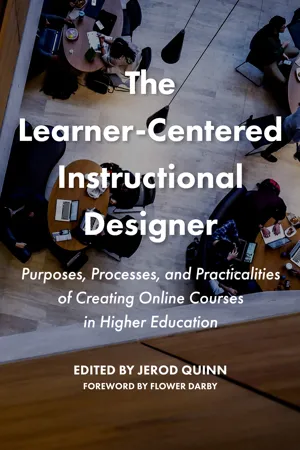
The Learner-Centered Instructional Designer
Purposes, Processes, and Practicalities of Creating Online Courses in Higher Education
- 252 pages
- English
- ePUB (mobile friendly)
- Available on iOS & Android
The Learner-Centered Instructional Designer
Purposes, Processes, and Practicalities of Creating Online Courses in Higher Education
About This Book
"What does a new instructional designer need to know to find her or his feet when working with faculty to create online classes?" This is a practical handbook for established and aspiring instructional designers in higher education, readers who may also be identified by such professional titles as educational developer, instructional technologist, or online learning specialist. Jerod Quinn, together with a team of experienced instructional designers who have worked extensively with a wide range of faculty on a multiplicity of online courses across all types of institutions, offer key guiding principles, insights and advice on how to develop productive and collegial partnerships with faculty to deliver courses that engage students and promote enduring learning.Designing and developing online classes for higher education takes a combination of pedagogical knowledge, the ability to build trust with faculty, familiarity with frameworks on how people learn, understanding of accessibility and inclusion, and technical skills to leverage a learning management system into an educational experience. Coming from diverse backgrounds, few instructional designers enter academia well versed in all of these aspects of creating online classes. This book provides the foundation on which instructional designers can build their careers. The guiding principle that animates this book is that the student experience and successful learning outcomes are paramount, and governs discussion of course design, pedagogy, the use of multimedia and technological advances, as well as the use of different forms of interactive exercises and group assignments. The succinct, informally written chapters offer ideas and means to apply theory to the daily work of instructional design and cover the four key components that drive this work in higher education: ·Defining the scope and main design approaches of our work·Building trust with the faculty we work with·Applying frameworks of how people learn·Mastering common online instructional practices.
Frequently asked questions
Information
Table of contents
- Cover
- Half Title
- Frontispiece
- Title Page
- Copyright Page
- Dedication
- Table of Contents
- Foreword
- Acknowledgments
- Introduction: Always Learner Centered
- Part One: Instructional Design in Academia: A Common Core with Different Approaches
- Part Two: Building Faculty Trust: You Can Trust Me, I’m a Professional
- Part Three: Frameworks that Touch Everything: The Lenses We Work With
- Part Four: Components of Online Classes: Practical Evergreens
- Conclusion: A Day in the Life
- Annotated Bibliography
- Editor and Contributors
- Index